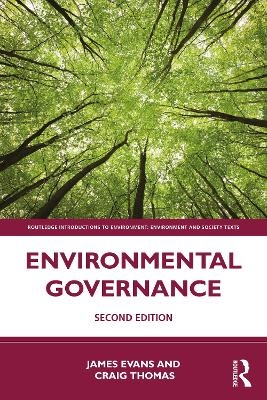
Environmental Governance
Routledge (Verlag)
978-1-032-36967-9 (ISBN)
Climate change is prompting an unprecedented questioning of the fundamental bases upon which society is founded. Businesses claim that technology can save the environment, while politicians champion the role of international environmental agreements to secure global action. Economists suggest that we should pay developing countries not to destroy their forests, while environmentalists question whether we can solve ecological problems with the same thinking that created them. As the process of steering society, governance has a critical role to play in coordinating these disparate voices and securing collective action to achieve a more sustainable future.
Environmental Governance is the only book to discuss the first principles of governance, while also providing a critical overview of the wide-ranging theories and approaches that underpin policy and practice today. It places governance within its wider political context to explore how the environment is controlled, manipulated, regulated and contested by a range of actors and institutions. This book shows how network and market governance have shaped current approaches to environmental issues, while also introducing approaches such as transition management and adaptive governance. In so doing, it highlights the strengths and weaknesses of the different approaches currently in play, and considers their political implications.
This second edition has been comprehensively updated to build upon the success of the acclaimed first edition, with a new chapter on the environmental governance of outer space and updated analysis of international climate change summits. It provides a ground-breaking overview of dominant and emerging approaches of environmental governance, forging critical links between them. Each chapter has been updated with new case studies, key debates and figures, and includes questions for discussion and further reading. It is essential reading for students of the environment, politics and sociology, and, indeed, anyone concerned with changing society to secure a more sustainable future.
James Evans is Professor of Geography at the University of Manchester, UK. His work investigates how cities learn to become smarter and more sustainable. Over the past 20 years he has worked with over 200 organizations around the world to create more collaborative ways of working toward sustainability. He has led the University’s involvement in major research projects to develop smart and more sustainable cities that have attracted more than £50m of research and innovation funding. Craig Thomas is Lecturer in Human Geography at the University of Manchester. His research and teaching focus on environmental governance and sustainability. Working on solutions to the climate crisis, he has examined anti-fracking activism, urban carbon reduction and ways to make space missions more sustainable. Craig is a scholar activist, working beyond academia to explore ways that the University can make a difference to the social and economic wellbeing of neighboring communities.
1. Introduction
2. Governing the Environment
3. Institutions, Rules and Actors
4. Global Governance
5. Networks
6. Markets
7. Transition Management
8. Adaptive Governance
9. Participation and Politics
10. Conclusions
| Erscheinungsdatum | 28.12.2023 |
|---|---|
| Reihe/Serie | Routledge Introductions to Environment: Environment and Society Texts |
| Zusatzinfo | 14 Tables, black and white; 16 Line drawings, color; 30 Halftones, color; 46 Illustrations, color |
| Verlagsort | London |
| Sprache | englisch |
| Maße | 156 x 234 mm |
| Gewicht | 570 g |
| Themenwelt | Naturwissenschaften ► Biologie ► Ökologie / Naturschutz |
| Naturwissenschaften ► Geowissenschaften ► Geografie / Kartografie | |
| Sozialwissenschaften ► Politik / Verwaltung | |
| Technik ► Umwelttechnik / Biotechnologie | |
| ISBN-10 | 1-032-36967-1 / 1032369671 |
| ISBN-13 | 978-1-032-36967-9 / 9781032369679 |
| Zustand | Neuware |
| Haben Sie eine Frage zum Produkt? |
aus dem Bereich


